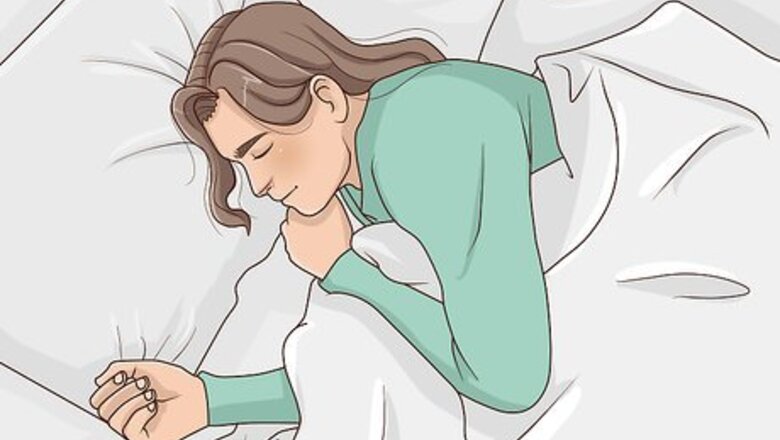
views
Maintaining Healthy Sleep Habits
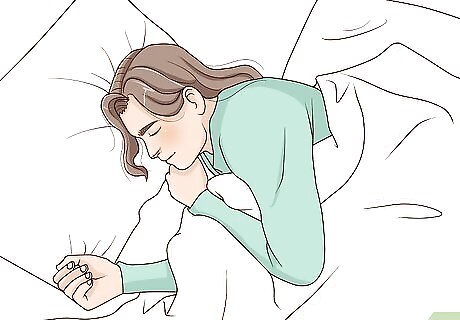
Plan to get at least 7-9 hours of sleep every day. The average adult under age 64 needs 7-9 hours of sleep in a 24-hour period to stay alert and healthy. Plan your sleep schedule so that you can get the amount of sleep you need each day, preferably without interruptions. Getting too little sleep will not only make it harder to stay awake and focus while you’re working, but it can also contribute to health problems, such as obesity, heart disease, and diabetes. If you’re 64 years old or older, you may only need 7-8 hours of sleep. Teens need 8-10 hours of sleep each day.

Stick to a consistent sleep schedule. When you’re working a night shift, it’s tempting to revert back to your customary sleeping patterns as soon as you have a little time off. However, doing this can make it much harder to get back into your work routine. Even when you’re not working, do your best to wake up and go to bed at the same times that you would during a regular work week. In addition to having a regular wakeup time, it’s important to keep your bedtime consistent. For example, you might aim to go to bed at 8 a.m. and wake up at 3 p.m. each day.
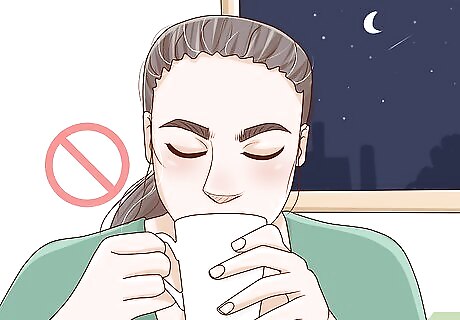
Avoid caffeine and other stimulants near the end of your shift. It’s okay to drink a little coffee early in your shift to help perk you up, but drinking caffeine too close to bedtime will make it harder for you to get to sleep. Avoid consuming coffee, energy drinks, or any other stimulants in the last 3-4 hours before you need to wrap up your shift and go home.Warning: Just like caffeine, alcohol can have a negative impact on your sleep quality. You might be tempted to use alcohol to help you nod off, but it’s likely to make you sleep poorly and leave you feeling more tired during your shift.

Turn off all bright screens at least 30 minutes before bed. The light from electronic screens, such as TVs, tablets, and phones, can energize you and make it harder to get to sleep. Avoid using screens as much as you can starting at least 30 minutes before you have to go to bed, or 1-2 hours before if possible. If reading before bed helps you unwind, stick to reading a print book or magazine instead of browsing the web or reading an e-book. If you strongly prefer reading on a screen, look for an “e-ink” tablet that mimics regular paper and releases less light, such as a Kindle Paperwhite or a remarkable tablet.

Develop a relaxing bedtime routine. If you have trouble unwinding before bed, set aside 30 minutes or an hour before you sleep to do things that help you relax. For example, you might: Read a book Listen to peaceful music Take a warm shower or bath Do light stretches or yoga Meditate Drink a soothing herbal tea or some warm milk
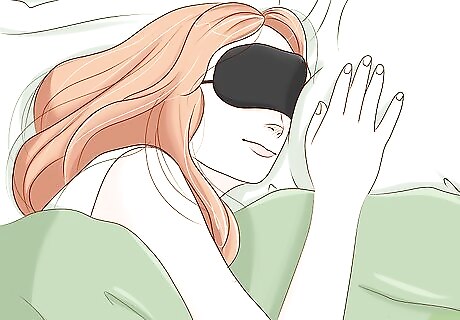
Keep your room dark, quiet, and comfortable. Daytime light and noise can make sleep especially challenging. To help you sleep during the day, darken your room as much as you can and keep the doors and windows shut to block out sound. Make sure your room is a comfortable temperature and that you have all the bedclothes you need to create a cozy sleep environment. If your blinds or curtains aren’t enough to keep sun out of your room, consider investing in blackout curtains or a sleep mask. You can also help minimize daytime noise with earplugs, noise-canceling headphones, or white noise.
Keeping Up Your Energy at Work

Get as much light exposure as possible at work. Your body’s natural rhythms are influenced by the changing light throughout the day. One of the challenges of working through a night shift is that you don’t have exposure to sunlight to help you feel awake and alert. To make up for this, try to keep your work area as brightly lit as possible, or purchase a portable light box to keep by your side as you’re working. On the other hand, getting too much light as your shift ends can make it harder for you to unwind and get into sleep mode. Keep sunglasses with you so that you can put them on during your commute home.

Nap for an hour before your shift if possible. Even if you get a solid block of 7-9 hours of sleep every day, it can still be tough to feel alert right before your shift. If you don’t feel rested enough when it’s time to go to work, try scheduling in an hour-long nap just before your shift begins. If your job allows it, you could also try taking a 15 to 20-minute power nap at some point during your shift.

Eat healthy meals and snacks during your shift. If you can’t get healthy food at your workplace, prepare some nutritious meals and a few healthy snacks that you can bring with you each night. To help keep you energized and healthy, avoid processed foods and junk food. Stick to fresh fruits and vegetables, lean proteins (such as beans, soy, fish, or poultry), whole grains, and foods rich in healthy fats (such as nuts, seeds, or avocados). Brown rice is a great choice to include in your meals, since it contains complex carbohydrates and energy-boosting manganese. To keep your energy up, try eating several small meals throughout your shift instead of fewer, heavier ones.

Stay hydrated while you work. Getting the fluids you need will help you feel more focused and awake. Bring a water bottle with you to work so that you can refill it whenever you need a drink, and take frequent sips throughout your shift.Tip: You can hydrate yourself with other beverages, but water is usually the healthiest choice. If you don’t like the taste of water by itself, try adding a splash of lemon or lime juice. You can also get fluids from hydrating foods, like soup, fruit, or vegetables.

Use caffeine sparingly for an extra energy boost. Drinking a small amount of coffee daily may help make you more alert and even provide other health benefits, such as reducing your risk of Parkinson’s disease and type 2 diabetes. However, drinking too much can make you jittery or even put strain on your heart if you don’t metabolize it well. If you choose to drink coffee while you work, limit yourself to 1-2 cups early in your shift. Avoid energy drinks, which can seriously disrupt your sleep patterns and lead to health issues such as heart problems, high blood pressure, anxiety, and digestive upset.
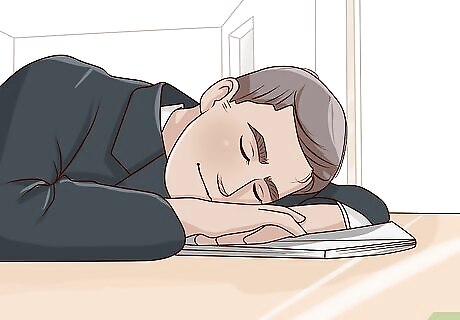
Rest for at least 20 minutes for every 6 hours you work. Rest breaks are important for keeping you alert and healthy at any job. If possible, schedule time for at least 1 rest break at some point during your shift. Use your rest break to walk around, have a healthy snack, do a little reading, or even put your head down for a brief nap.
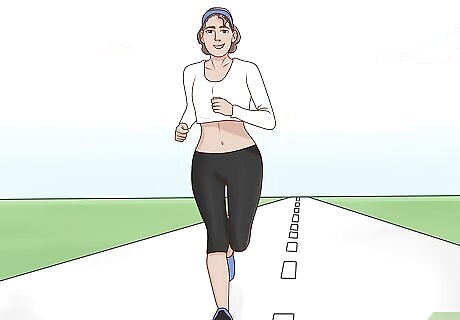
Try to get at least 30 minutes of physical activity each day. Whether it’s during your shift or while you’re off the clock, moving around a little bit every day can help boost your energy and keep you healthy. Try to take brief breaks to walk around or do light stretches while you work. You can also set aside time before or after your shift or on your nights off to jog, go biking, or visit the gym. If you’re stuck at a desk during your shift, you can still get in a little physical activity by doing seated exercises, such as chest squeezes, toe and heel raises, and leg extensions. In addition to keeping you physically fit, exercise can also boost your mood and even help you focus better and think more clearly.
Caring for Your Mental Health

Schedule time to spend with family and friends. Working a night shift can make it extra tough to find time for the people you care about. Communicate with your family and friends about your work schedule, and make plans for spending quality time together. For example, if you get home in the early morning, your significant other might plan to get up early a few days a week so you can have a meal together after your shift ends. Try to make the most of your time together so that it won’t be stressful for you and your loved ones. You may not have a lot of time to spend with them, so focus on quality instead of quantity.

Set aside time for hobbies and fun activities. Taking time to have fun helps relieve stress, boost your energy, and improve your focus. It’s especially important to find time for fun when you have a difficult work schedule. If possible, set aside a little time each day to do things you enjoy, such as playing games, working on creative projects, or watching your favorite TV show.Tip: If you commute on public transit, you can even use that time to relax and have a little fun. For example, you could play games on your phone or tablet, play sudoku or crossword puzzles, or do a little knitting on the bus or train.

Try stress-relieving techniques to help you unwind. Working a night shift can be super stressful, so it’s important to develop some good coping skills. If you find yourself stressing about work, try meditating or doing some breathing exercises to help you unwind. You might also find it helpful to: Write in a journal Do mind-body exercises like yoga or tai chi Draw or color Do progressive muscle relaxation exercises

Talk to a doctor or therapist if your work is really stressful. If you’re not coping well with night shift work, your doctor or a therapist may be able to help. In addition to suggesting better coping techniques, they might be able to prescribe or recommend medications or supplements to help you feel better. Talk to your doctor if: You have trouble staying awake at work or during your commute You’re not sleeping well You feel anxious or depressed You’re worried about your physical health




















Comments
0 comment